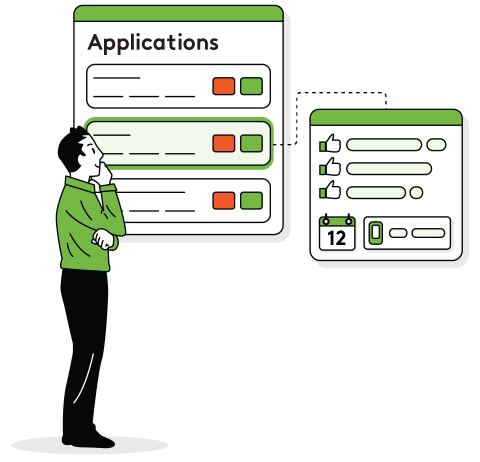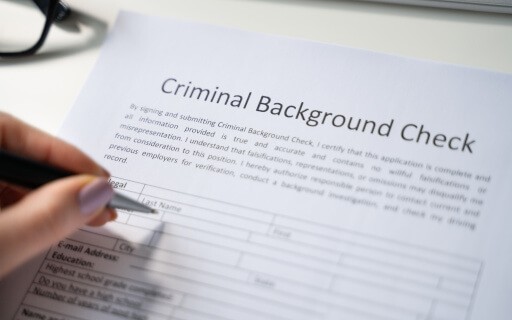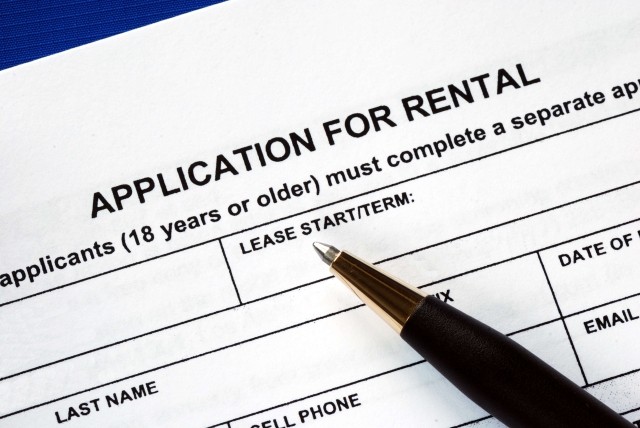
Requesting proof of income is an important part of the tenant screening process. If you have certain income requirements for your residents, such as having an income that’s equal to at least three times the cost of rent, then you will need to ensure any applicants for your rental property meet those requirements. The best way to do that is to require proof of income when a renter applies to rent your unit. Although some ways are more commonly used than others, here are 15 ways renters can show landlords or property managers proof of income:
- Pay Stubs
- Bank Statements
- W-2 Income Statement
- Tax Returns
- Formal Letter from Employer
- Social Security Benefits Statement
- 1099 Form
- Annuity Statement
- Pension Distribution Statement
- Worker’s Compensation Letter
- Court Ordered Awards Letter
- Interest and Dividend Income
- Severance Statement
- Proof of Bonus and Incentive Payments
- Unemployment Statement
What Is Proof of Income?
Proof of income is a critical component in the tenant screening process. It serves as a verification tool that the applicant has a stable income source and can afford the rent. This is a common requirement by landlords to ensure that the applicant’s income is at least three times the rent, providing a safety net and reducing the risk of missed payments.
Proof of income can come in various forms, each providing a different perspective on a renter’s financial stability. Pay stubs, for instance, offer a snapshot of the renter’s current earnings and employment status. They show the gross income, deductions, and net income, giving a clear picture of the applicant’s take-home pay.
Understanding proof of income is essential. It helps you assess the financial stability of potential tenants and mitigate the risk of non-payment. For your renters, providing proof of income is a key step in securing a rental property. By being prepared with the appropriate documents, your renters can demonstrate their financial stability and increase their chances of approval, helping you fill your vacancies faster.
Why Is Proof of Income Important for Landlords?
Proof of income is a critical tool in your tenant screening process. It provides insight into a potential tenant's financial stability and their ability to meet rent obligations. By verifying a renter’s income, you can mitigate potential financial risks, such as late or missed rent payments. This process typically involves assessing whether the applicant’s income meets a certain threshold, often set at a level where the rent should not exceed a third of the renter’s income.
In addition to risk mitigation, proof of income helps ensure a consistent rental income stream, which you rely on for various purposes like mortgage payments, property maintenance, and other operational costs. Furthermore, it aids in fostering a positive landlord-tenant relationship by setting clear expectations about rent affordability. Understanding the significance of proof of income is a crucial step towards successful property management, whether you're a seasoned rental manager or a first-time landlord.
15 Ways Renters Can Show Proof of Income
1. Pay Stubs
Pay stubs are one of the most used ways to show proof of income. Renters with part-time or full-time jobs can easily obtain this document from their employer or find it in their company portal. You should require pay stubs from at least the last two months to determine how often the applicant is paid and what their gross and net income is (and if it fluctuates).
2. Bank Statements
Renters who are self-employed won’t receive regular pay stubs, so providing their bank statements from the last two to three months is a great way to show proof of income. If the applicant has a commission-only salary, be sure you’re seeing a few months of their bank statements to determine if their income is steady enough to fit your income requirements.
3. W-2 Income Statement
A W-2 form is a standard document the government uses to verify income for tax purposes. It’s produced by an employer and is very reliable. It’s a great way to see the applicant’s declared income from the previous year (and whether it was consistent). However, most renters don’t have this document readily accessible, and it doesn’t give an up-to-date picture of their income since it does not account for raises, job changes, or promotions.
4. Tax Returns
The IRS 1040 (Individual Income Tax Return) is very comprehensive and doesn’t overstate the applicant’s income. Tax returns are a great way to check for proof of income because they show unearned income as well as overall income history. However, the same goes for tax returns as a W-2: it may be hard for renters to find and it may not represent their current income.
5. Formal Letter from Employer
A formal letter from their employer is easy for a renter to obtain. You may be able to learn more about the applicant this way as well, especially if the employer happens to give a reference to the tenant’s work ethic. A letter from an employer gives you a current look into the applicant’s work life and provides some qualitative feedback. The only drawback is that a letter can easily be forged, but you can simply call the employer to verify the letter if need be.
6. Social Security Benefits Statement
A social security statement means that the applicant’s income is coming from the government, which means it’s stable. This statement is easily verified, consistent, and not typically taxed. Renters with social security benefits can easily download and submit a copy of their social security proof of income letter to verify their income. However, social security payments can be stopped if there are any changes to distribution rules.
7. 1099 Form
The IRS Form 1099 covers miscellaneous income, meaning it’s the document used for self-employed renters. If a renter doesn’t feel comfortable sharing their bank statements, they can share their 1099 form instead. This tax document is easily verified, but there is a drawback. A self-employed renter could have multiple 1099s, so it’s difficult to verify if their income will remain steady throughout the year.
8. Annuity Statement
There are several types of annuities. For instance, a renter could receive annuity from an inheritance or be a retiree, meaning they have a contract with an insurance company where in exchange for a lump sum of money, they are promised a steady stream of cash flow. An annuity statement is easily verifiable and is usually consistent income. However, this money could have an end date, so be sure to check the statement’s date of expiration.
9. Pension Distribution Statement
A pension distribution statement is called a 1099-R on a tax return. This statement includes retirement benefits like pensions and annuities and is typically a great source of consistent income. However, it can be difficult for landlords to differentiate an applicant’s monthly distributions versus annual distributions from this statement. Also, the pension can change the distribution amount.
10. Worker’s Compensation Letter
A renter will typically receive a worker’s compensation letter if they were hurt in a workplace accident. A worker’s compensation letter should be issued by either the insurance company or the court awarding the compensation. This letter is easily verifiable, but there is typically a duration for this type of income. Be sure to check the statement’s date of expiration.
11. Court Ordered Awards Letter
A renter may be receiving compensation from an agreement such as alimony or child support. They would obtain a copy of these agreements from the court, known as a court ordered awards letter, which would show a mandated payment. The only downfall to this proof of income is that the court order can be appealed or stalled for a significant amount of time, preventing the applicant from receiving a steady income from the court-ordered mandate.
12. Interest and Dividend Income
Interest and dividend income can easily be found on the applicant’s tax return or a brokerage statement. On the tax return, there will be a 1099-INT and a 1099-DIV. This proof of income is very reliable, but it’s usually not enough to make a material difference in the applicant’s income level.
13. Severance Statement
If a renter has been laid off from their job, they will receive a severance statement, which can be used as proof of income. The severance statement usually entails a large cash deposit, which will assist the tenant in paying rent for several months. However, this is usually a one-time influx of funds, which can’t be relied on for ongoing rent payments.
14. Proof of Bonus and Incentive Payments
Renters who are real estate agents, mortgage brokers, or have any commission-based job can provide documentation for proof of bonus or incentive payments. Commission-only tenants often have a steady source of income, but it can be very hard as a landlord to determine if this income is reliable enough to meet your income requirements.
15. Unemployment Statement
If a renter is receiving unemployment benefits, they can provide you with a government document generated by the state unemployment office. This money is guaranteed income from the government, but it may run out, so be sure to check the expiration date (if applicable) on the unemployment statement.
Challenges Faced by Landlords in Verifying Income
Income verification is a critical step in the tenant screening process, but it's not without its challenges. You may face several hurdles in accurately verifying a potential tenant's income.
One of the primary challenges is the variety of income sources. Applicants may have multiple income streams, including full-time employment, part-time jobs, freelance work, government benefits, or income from investments. Each of these sources may require different forms of proof of income, making the verification process complex. For instance, verifying income from freelance work or investments may require bank statements or tax returns, while income from employment can be verified through pay stubs or W-2 income statements.
Another challenge is the potential for fraudulent documents. With the advancement of technology, it has become easier for individuals to forge documents, including pay stubs and tax returns. You need to be vigilant and aware of the signs of fraudulent documents, such as inconsistencies in formatting, spelling errors, or numbers that don't add up.
Privacy concerns can also pose a challenge in income verification. You need to balance the need for thorough income verification with respect for the rental applicant’s privacy. This can be particularly challenging when it comes to contacting employers or banks to verify information. You must ensure you have the renter’s permission before doing so and must handle all personal information with care to comply with privacy laws.
The fluctuating nature of some types of income can also pose a challenge. For instance, residents who work in industries with seasonal fluctuations or who rely on commissions or tips may have income that varies from month to month. In such cases, you may need to consider a longer income history to accurately assess the applicant’s ability to afford the rent.
Legal Considerations in Income Verification
Income verification is a key part of tenant screening. Respect the applicant’s privacy during this process and request only necessary documents then use the information solely for income verification.
-
Avoid discrimination against potential tenants. The Fair Housing Act prohibits discrimination based on factors like race, color, national origin, religion, sex, familial status, or disability. Some states and cities prohibit discrimination based on income source. Familiarize yourself with local laws.
-
Handle fraudulent documents with care. If fraud is suspected, proceed carefully and consider consulting with a legal professional. Tips for Verifying Applicants’ Proof of Income
After you receive proof of income from an applicant, it’s vital to verify this information. Check to see if the applicant is still at the job they listed and confirm that they plan to stay there for the foreseeable future. If an applicant doesn’t meet your income requirements, but you still wish to rent to them, ask them to provide a cosigner. If they find a cosigner, you’ll also want to require proof of income from the cosigner.
When discussing the cost of rent with applicants, remember to bring up the cost of utilities. If utilities are included in the rent, then the income requirements should cover this. If they’re not included, give them a rough estimate of the cost of utilities for your unit per month (since some will depend on usage) to help them determine their budget (if their application is approved).
How to Choose the Right Renter
The right resident for you and your property should meet your requirements to rent. An applicant who meets your income requirements stands a better chance of paying rent on time (in full) every month. After you have received the applicant’s proof of income, you’ll want to consider other factors before approving their application. During the tenant screening process, you may want to have other requirements, such as professional and landlord references.
Additionally, listing your property on Apartments.com provides you with access to a full suite of rental tools, including tenant screening. With easy-to-read credit reports and reliable background checks, you can gather all the necessary information to screen applicants effectively and choose the right tenant. Apartments.com is a comprehensive resource that equips landlords with the tools, resources, and support needed for effective tenant screenings. By leveraging these offerings, you can navigate the tenant screening process with confidence, secure reliable residents, and maintain a successful rental business.
Frequently Asked Questions
Can proof of income for a rental property be faked?
Yes, be cautious when verifying proof of income. It’s best to require two or three documents to verify a tenant’s income. If you are unsure of something, ask the tenant to explain, or ask them to provide another form of income verification.
Should I deny an applicant who is unemployed?
Not always, but you need to make sure they have a steady stream of income that meets your income requirements. Social security, unemployment, workers compensation, and annuity are all valid forms of income verification as long as they meet the requirements.
Is proof of income different for a student?
Students can provide proof of income in several ways. If their income meets the requirement, they can use one of the methods above. If the student is on a scholarship or has another source of income, an official letter from the funding organization stating the amount of funding and the payment schedule should be provided. Landlords could also consider allowing guarantors or cosigners.
Do all landlords require proof of income?
Legal requirements are dependent on what city and state your rental property is located in. For more information, contact a local real estate attorney.
This article was originally published on August 3, 2022, by Megan Bullock.











